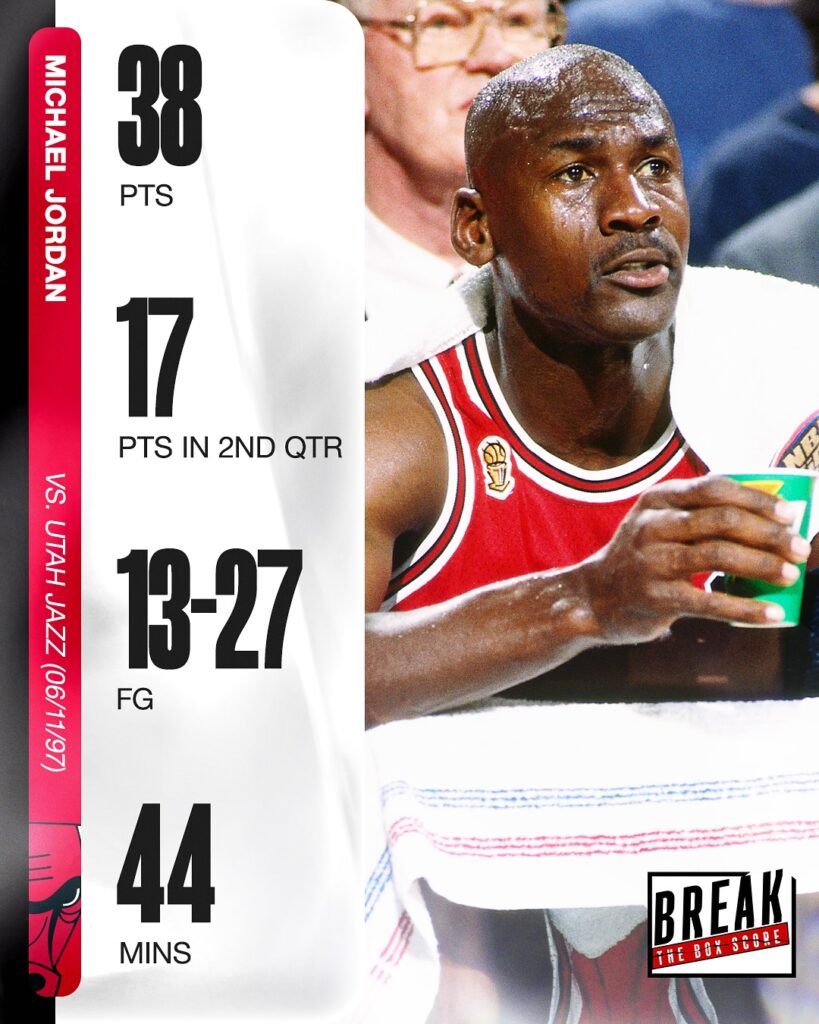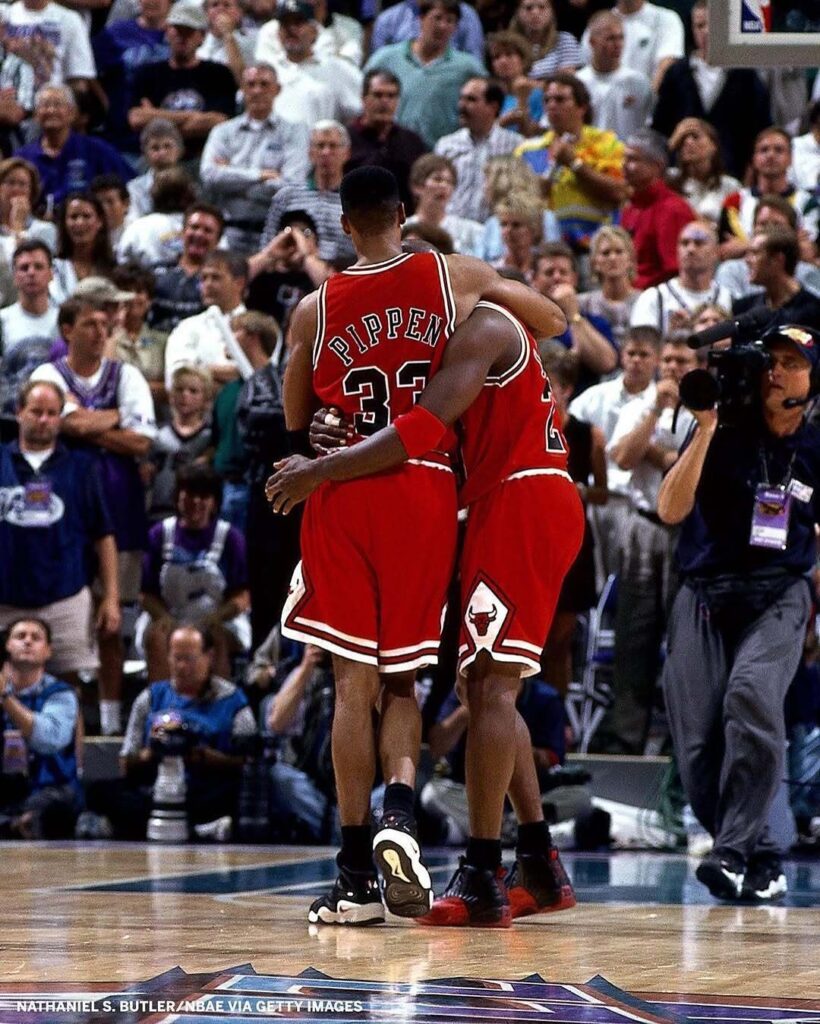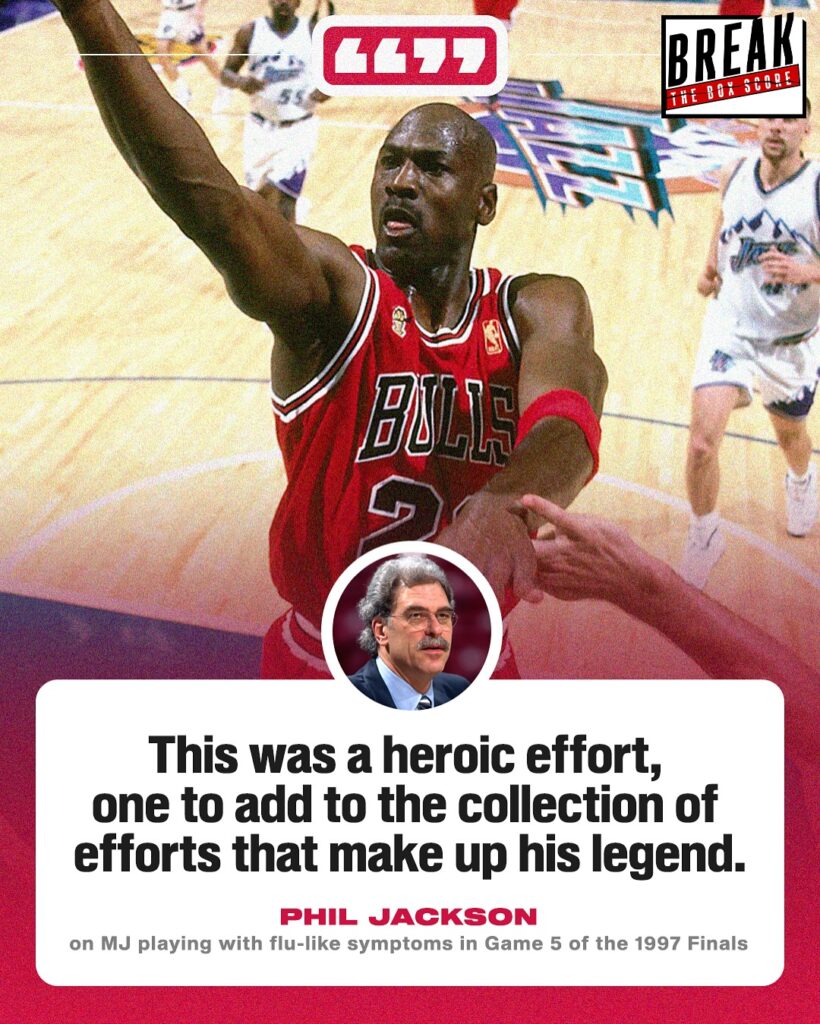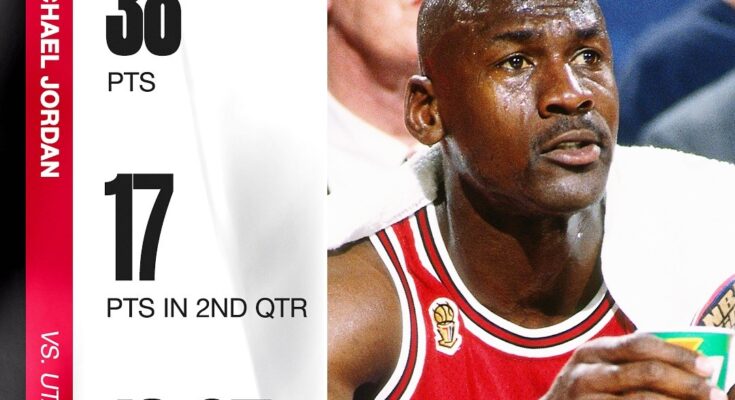
On June 11, 1997—28 years ago today—Michael Jordan delivered one of the most iconic performances in sports history. Game 5 of the NBA Finals between the Chicago Bulls and the Utah Jazz wasn’t just another contest. It became a symbol of human willpower, mental toughness, and greatness under pressure. What unfolded in Salt Lake City that night is forever etched in the minds of basketball fans around the world: the “Flu Game.”
By that point, the 1997 NBA Finals were evenly poised. The series was tied 2–2, and Game 5 was to be played in Utah, in front of a hostile, roaring crowd. The Jazz had just won two straight games at home, with Karl Malone and John Stockton leading the charge. The momentum was shifting. The Bulls needed to take back control of the series—and they needed their leader more than ever.
But something was wrong.
That morning, reports surfaced that Michael Jordan was seriously ill. Not just a cold or a slight fever—he was visibly weakened, dehydrated, and bedridden. Later reports suggested food poisoning, possibly from a late-night pizza ordered to his hotel room. Others speculated it was the flu. Whatever the case, Jordan was in bad shape. Most assumed he wouldn’t play. But anyone who had followed MJ’s career knew: he wasn’t wired like everyone else.
When tip-off came, Jordan was on the floor.

From the start, it was clear he was struggling. He looked pale, drenched in sweat, and was often seen hunched over, hands on knees, gasping for air. But slowly, as the game progressed, something incredible happened—he found a rhythm. Not just any rhythm, but a vintage MJ performance. He would go on to score 38 points, grab 7 rebounds, and dish out 5 assists in 44 grueling minutes. He hit clutch shots. He played tough defense. He willed himself to greatness.
The most iconic image of that night came in the closing seconds: with the Bulls up 90–88 after a dagger three-pointer from Jordan, he collapsed into Scottie Pippen’s arms. Pippen, his longtime teammate and co-star, helped him off the court like a brother. The moment captured more than a basketball win—it showed what greatness looks like under unimaginable physical and emotional strain.
Jordan later described that game as one of the hardest he ever played. “I was almost unconscious. I couldn’t breathe,” he recalled in an interview. “I was just trying to do whatever it took to win.”

And win he did. The Bulls took Game 5, then closed out the series in Game 6 at home in Chicago, securing their fifth championship of the decade. The Flu Game became more than a footnote—it became a turning point, the moment that defined the 1997 Finals and added yet another legendary chapter to Jordan’s mythos.
Looking back now, 28 years later, the game remains larger than life. In an era before social media and instant viral moments, Jordan’s performance spread through newspapers, ESPN replays, and word-of-mouth stories that became legend. Kids growing up in the late ‘90s weren’t just hearing about a great basketball player—they were hearing about a warrior who played through pain, who couldn’t walk but could still fly.
The Flu Game has inspired athletes across all sports. From LeBron James and Kobe Bryant to countless high school and college players, MJ’s performance is often cited as the gold standard of playing through adversity. It’s taught generations that sometimes, greatness doesn’t just show up when you feel 100%—it shows up when you push yourself to the brink and still deliver.
But there’s more to the story than just points and stats. The Flu Game is also about leadership, sacrifice, and trust. Jordan could’ve sat out. Few would’ve blamed him. But he knew what was at stake—not just for himself, but for his teammates, the fans, and the legacy they were building. He showed up. He gave everything. And he trusted Pippen and the others to lift him when he needed it most.
Over the years, documentaries and interviews—especially The Last Dance—have added more color and context to that night. Viewers learned just how sick Jordan truly was, and how much doubt there was even within the team. Yet he still managed to block out the noise, focus on the game, and carry the Bulls to a crucial win.
Today, we live in a time when every performance is instantly analyzed and archived. But even in 2025, with all the modern greatness we see from today’s NBA stars, the Flu Game still stands tall. It’s not just about the numbers—it’s about the story. A sick, exhausted Jordan rising to the occasion. A loyal teammate carrying him off the court. A game that turned a tied series into a path to championship glory.
Twenty-eight years ago today, a man who couldn’t keep food down and could barely walk gave the world a performance for the ages. Michael Jordan didn’t just play basketball that night—he wrote history.
And the rest… well, the rest is exactly what the caption says: history. 😮💨



